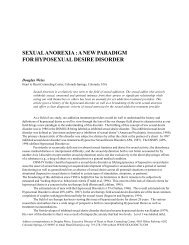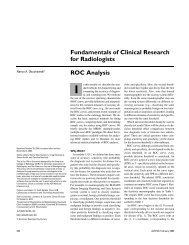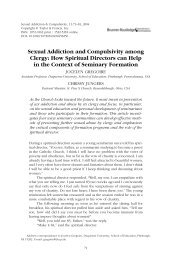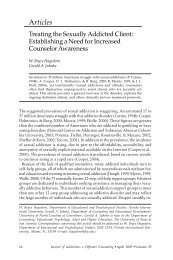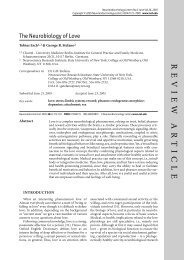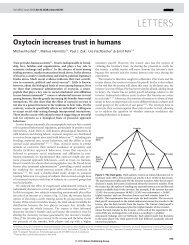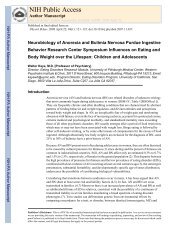An Overview of Psychiatric Ethics
An Overview of Psychiatric Ethics
An Overview of Psychiatric Ethics
You also want an ePaper? Increase the reach of your titles
YUMPU automatically turns print PDFs into web optimized ePapers that Google loves.
52<strong>of</strong>fered by defendants in the “Doctors’ Trial”, yet it remains difficult to define a core moral failing.As such, the invocation <strong>of</strong> the Nazi doctors is problematic in contemporary bioethical discourse. 372“The Nuremburg Code”, the declaration <strong>of</strong> ethical principles which formed the basis <strong>of</strong> currentCodes <strong>of</strong> <strong>Ethics</strong> for research, emphasizes the importance <strong>of</strong> informed consent to researchparticipation. Informed consent to participate in psychiatric research is amongst the most vexed373, 374<strong>of</strong> issues in the field.One lingering question is the notion <strong>of</strong> the universalizability <strong>of</strong> the Nuremburg Declaration. TheNuremburg Declaration, arguably, sees the global imposition <strong>of</strong> liberal <strong>An</strong>glo-American valuesunder the rubric <strong>of</strong> the emergent notion <strong>of</strong> ‘human rights’. 375 Regardless <strong>of</strong> the apparent validity<strong>of</strong> such constructs, the question <strong>of</strong> the universalizability <strong>of</strong> the concept <strong>of</strong> informed consent isproblematic. A particular issue is whether data obtained from research participants from settingsother than a researcher’s own institution are subject to the same valid forms <strong>of</strong> consent as requiredin the researcher’s own country. There is emerging evidence that informed consent to participate inresearch programs is challenging in settings such as China 376 and West Africa, 377 where increasingamounts <strong>of</strong> psychiatric and neuropsychiatric research are performed, presumably due to costbenefits and the availability <strong>of</strong> research participants. This then raises the question <strong>of</strong> what theethical grounds are for publishing such research, if there are credible doubts about the adequacy<strong>of</strong> informed consent to research into psychiatric treatment.In conducting research in psychiatry, there is an ever-present tension between the duty to protectvulnerable individuals and the duty to advance scientific knowledge. It is argued that concern aboutvulnerability <strong>of</strong> psychiatric patients has contributed to slow progress in psychiatric research. 378 Theprocess <strong>of</strong> obtaining informed consent and competence to participate in psychiatric research have374, 379tended to be the main focus <strong>of</strong> the literature in the area <strong>of</strong> research ethics in psychiatry.There are four commonly used standards for a person’s competency evidencing a choice in regardto research participation. 380 The first is the patient’s ability to acknowledge they have a choice tonot participate in the research study. The second is the patient’s factual understanding <strong>of</strong> the issuesinvolved in their participation in the research study. The third is the patient’s capacity for rationalmanipulation <strong>of</strong> information provided to them about the research, such as the possibility <strong>of</strong> beingallocated to a placebo or control condition and the risks associated with this. The fourth and finalis the patient’s appreciation <strong>of</strong> the nature <strong>of</strong> the situation, in particular the ability to distinguishbetween their access to care being independent <strong>of</strong> whether or not they choose to participate in theresearch project. These standards move from a basic grasp <strong>of</strong> the issue through to a more abstractunderstanding <strong>of</strong> the totality <strong>of</strong> the situation, a process which is not always the case with severely illpatients. Clearly, the closer the consent to the higher standards, the more comprehensive is the level<strong>of</strong> informed consent in the study.Clinical trials involving psychotropic medications are problematic, given the enforced nature <strong>of</strong> muchpsychiatric treatment, particularly in the chronic mentally ill. 373 Many such patients feel obligated toparticipate in such research, as they may misunderstand the imperative to participate. Moreover, theuse <strong>of</strong> children as subjects in psychiatric research represents a similar concern <strong>of</strong> the vulnerability <strong>of</strong>such patients in the therapeutic relationship. 381-383<strong>Ethics</strong> and Consultation-Liaison PsychiatryThe Nature <strong>of</strong> C-L PsychiatryOne <strong>of</strong> the fundamental features <strong>of</strong> the role <strong>of</strong> a C-L psychiatrist is the ambiguous nature <strong>of</strong> therelationship with the patient. C-L consults are frequently sought by the treating team and not thepatient, which creates a fundamentally “social role” in C-L psychiatry. 384 This social role focuseson the relationship between primary physician or non-medical health pr<strong>of</strong>essionals and consultantpsychiatrist who works within an institutional setting.The <strong>Ethics</strong> <strong>of</strong> Managing the SystemA frequent pretext <strong>of</strong> the involvement <strong>of</strong> a C-L psychiatrist in a clinical situation is to provide anintervention at the level <strong>of</strong> a system, such as where there is a problematic relationship betweena difficult patient and a medical team. In such circumstances, the C-L psychiatrist is expected



